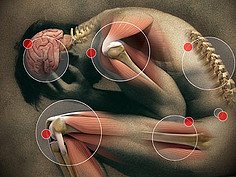.
“As an undergraduate student in psychology, I was taught that multiple personalities were a very rare and bizarre disorder. That is all that I was taught on ... It soon became apparent that what I had been taught was simply not true. Not only was I meeting people with multiplicity; these individuals entering my life were normal human beings with much to offer. They were simply people who had endured more than their share of pain in this life and were struggling to make sense of it.”
― Deborah Bray Haddock, The Dissociative Identity Disorder Sourcebook
Somatic Symptom and Related Disorders
Somatic symptom and related disorders are disorders that are characterized by somatic features (physical symptoms) that are linked to stress and impairment.
It is important to note that the emphasis of somatic symptom and related disorders are the abnormal thoughts, feelings, and behaviors associated with somatic symptoms, not that the somatic symptoms cannot be medically explained. Somatic symptom and related disorders can exist alongside other medical conditions, and there are many alternate explanations for unexplainable symptoms that do not assume that the symptoms are due to a mental disorder. Medically unexplained symptoms play a prominent role in conversion disorder and other specified somatic symptom and related disorder, but unexplained somatic features may also signify disorders such as major depressive disorder or panic disorder or be comorbid with such disorders. Again, what is important is not so much the symptoms themselves as the manner in which the individual reacts to them and the individual's degree of preoccupation with them (American Psychiatric Association, 2013).1
Somatic symptom and related disorders are associated with genetic vulnerabilities, early traumatic experiences, high degrees of stress or sensitivity to stress, social reinforcement towards physical but not mental symptoms, and cultural bias against mental illness (American Psychiatric Association, 2013).1 Somatic and especially conversion symptoms are heavily associated with dissociative disorders, especially in non-Western cultures. The ICD-10 calls dissociative disorders conversion disorders and places them between "reaction to severe stress, and adjustment disorders" and "somatoform disorders" ("Neurotic, Stress-related and Somatoform Disorders," 1993, pp. 33-34).2
Somatic symptom and related disorders include:
- Somatic Symptom Disorder
- Illness Anxiety Disorder
- Conversion Disorder (Functional Neurological Symptom Disorder)
- Psychological Factors Affecting Other Medical Conditions
- Factitious Disorder
- Other Specified Somatic Symptom and Related Disorder (Pseudocyesis)
- Unspecified Somatic Symptom and Related Disorder
Somatic symptom disorder, illness anxiety disorder, psychological factors affecting other medical conditions, other specified somatic symptom and related disorder, and unspecified somatic symptom and related disorder are not addressed within a unique page on this website. Somatic symptom disorder is characterized "by distressing somatic symptoms plus abnormal thoughts, feelings, and behaviors in response to these symptoms" (American Psychiatric Association, 2013).1 It frequently involves multiple somatic symptoms, though sometimes it can present with only one severe symptom, usually severe pain. When multiple symptoms are present, they can be experienced as normal bodily sensations or discomfort, and symptoms can be specific and localized or generalized. Again, symptoms can be caused by a known condition and still lead to a diagnosis of somatic symptom disorder if the individual's reactions to their symptoms are disproportionate and disruptive or disabling. Treating any existing medical issues will often fail to alleviate the individual's concerns and may instead cause a worsening of their symptoms (American Psychiatric Association, 2013).1
Illness anxiety disorder contains the 25% of individuals who were diagnosed with hypochondrias but do not fit the criteria for somatic symptom disorder. It is characterized by individuals who have strong anxiety related to their physical health in the absence of somatic symptoms; it could also be considered an anxiety disorder. Psychological factors affecting other medical conditions is characterized by "one or more clinically significant psychological or behavioral factors that adversely affect a medical condition by increasing the risk for suffering, death, or disability" (American Psychiatric Association, 2013).1 Examples include refusing to consistently take prescribed medication, follow treatment guidelines, or acknowledge signs of severe health problems. Finally, other specified somatic symptom and related disorder and unspecified somatic symptom and related disorder serve as categories meant to catch presentations that do not fit one of the above categories or cannot be adequately diagnosed (American Psychiatric Association, 2013).1
1 American Psychiatric Association. (2013). Somatic Symptom and Related Disorders. In Diagnostic and statistical manual of mental disorders (5th ed.). http://dx.doi.org/10.1176/appi.books.9780890425596.dsm09
2 Neurotic, stress-related and somatoform disorders. (1993). In The ICD-10 classification of mental and behavioural disorders: Diagnostic criteria for research (pp. 33-34). Geneva: World Health Organization.
